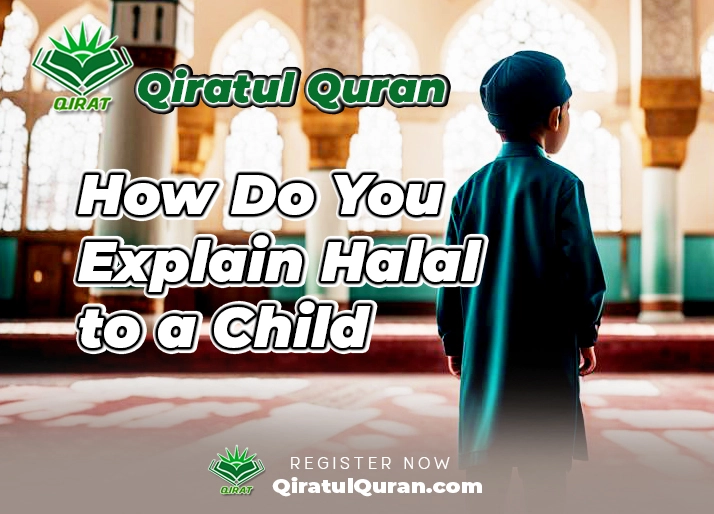
The Way Explaining Halal to Your Child
Explaining Halal to Your Child can seem daunting, but it’s an important part of bringing up Muslim children. With some simple language and relatable examples, you can help them understand what halal means and why it matters.
What Does “Halal” Mean?
The first step is breaking down the actual term “halal.” Here are some ways to explain its meaning:
- Halal means something is allowed or permitted according to Islamic law.
- Foods and actions that are halal are good for us and please God.
- If something is haram, that means it is forbidden in Islam. Halal is the opposite of haram.
Relate it to their own lives – just like they have rules from you about bedtimes, doing homework, etc., God and Islam have rules about what foods Muslims can eat and what actions are permitted.
Why Do Muslims Eat Halal Foods?
Kids are naturally curious, so they’ll likely ask why it matters whether a food is halal. Engage their curiosity for the chance to teach them more about the religion. Here are some discussion points:
- Eating halal foods helps us lead good, healthy lives according to Islam.
- Allah instructs Muslims in the Quran to eat good, permitted foods. It makes Him happy when we follow this rule.
- Muslims try to treat animals kindly – the way halal meat comes from the animal is supposed to minimize suffering.
You can give examples like telling stories about Prophet Muhammad (PBUH) loving cats and dogs to showcase Islamic principles about animal welfare. Kids love stories, so this is a great tactic.
What Foods Are Halal?
The specifics around whether a food is halal depend a lot on how it was made or handled:
- Halal meat comes from animals like cows, sheep, goats, fish, etc. slaughtered in a special religious way
- Vegetables, fruits, and grains are allowed as long as they don’t contain anything haram
- Sweets are usually halal unless they have pork-based gelatin or alcohol
Turn checking labels on food into a game for them. Quiz kids to find the “halal” label or have them inspect candy wrappers looking for undisclosed haram ingredients. They’ll have hands-on fun learning what their favorite snacks contain.
What Does Halal Certification Mean?
You’ll probably grocery shop as a family, giving you the chance to educate kids on proper halal labels and certification:
- Authorized third parties inspect foods and production facilities for compliance with Islamic dietary rules.
- When companies meet the standards, they can get certified as halal.
- This certification is shown through credible halal labels on packaging.
Show examples when you’re at the market – point to the many foods carrying certification from agencies like the Islamic Food and Nutrition Council of America (IFANCA) or the Islamic Services of America.
Let Kids Ask Questions
Kids always have questions – let them ask anything that comes to mind regarding halal eating!
- Be patient – saying “that’s not an appropriate question” may discourage their curiosity.
- Answer honestly at their level – no need for lengthy theological discussions.
- Admit if you don’t know something – then research it together later.
Creating open, nonjudgemental dialog sets the tone for kids to take an interest, engage critically with concepts, and internalize the deeper meaning behind these eating guidelines for life.
Make It Easy with Engaging Activities
Many activities can teach the essence of halal in interactive, entertaining ways:
Cook a Meal Together
- Choose a simple halal recipe to make together.
- Talk through checking for halal certification on ingredients.
- Get excited about enjoying permitted foods that please Allah.
Cooking is hands-on fun. Plus, kids get excited to eat food they help make!
Read Halal Story Books
- Find children’s books dealing with Muslim eating practices.
- Have kids take turns reading paragraphs out loud.
- Discuss what the characters learn about halal.
Reading builds comprehension while fictional narratives make it relatable.
Put on a Halal Puppet Show
- Use stuffed animals or puppets to act out “Halal Helpers,” a pretend cooking show.
- The host interviews “guests” – fruits, animals, sweets – asking if they’re halal or not.
- The puppets also share how they should be handled according to Islam.
Puppets spark creativity and memorable lessons through play.
Lead by Example in Daily Life
More than anything you teach directly, kids will internalize halal consciousness by observing how you apply the concept:
- Show them how you check labels and pick items when grocery shopping.
- Explain why you may avoid certain desserts at a birthday party that likely contain haram ingredients.
- Answer casually when waiting for staff to ask if you have dietary restrictions.
Kids are incredible mimics. Seeing you gracefully live by halal principles makes an imprint no lecture can replicate.
Frame Halal as an Act of Faith, Not Restriction
Some children may perceive Islamic dietary rules as limiting if peers get to eat whatever they want. Prevent this thinking pattern by emphasizing the higher purpose behind these guidelines – say things like:
“Allah asks this of Muslims to help them show devotion.” “Eating halal helps our community come together.” “We get to take part in the same eating traditions as Prophet Muhammad S.A.W!”
This attitude adjustment positions halal as a special opportunity to embrace rather than restrictions holding them back. It catalyzes an intrinsic desire in kids to participate.
Tailor Explanations as Kids Grow Up
How you discuss halal should meet children at their level of understanding as they mature:
Preschool Age (3-4 years old)
At this simplest stage, focus on familiarizing them with the term in concrete ways:
- Say basic definitions – halal means OK to eat!
- Point out halal labels on packaging when shopping.
- Use colorful picture books showing Muslim foods.
Keep explanations clear, short, and tied to things they recognize.
Grade School (6-10 years old)
Lengthier conversations are appropriate for grade-schoolers with bigger vocabularies and attention spans:
- Explain why Muslims eat halal using religious reasoning they can grasp in plain terms.
- Go over specific Quran verses and Hadith regarding food if they show interest.
- Discuss ethical dimensions around permitted slaughter practices.
Connect the dots between halal foods and broader Muslim ethics at an introductory level.
Middle School (11-13 years old)
Tweens enter a highly inquisitive phase seeking adult-like clarity on Islamic principles previously taken for granted.
- Provide scriptural evidence behind halal guidelines when asked.
- Discuss gray areas – techniques like stunning animals before slaughter and the debates around them.
- Answer questions about food additives like enzymes or flavorings used in packaged products.
Give nuanced explanations (with disclaimers if needed) to align practices with deeper theological reasoning.
Throughout Adolescence
As social circles expand through the teen years, peer dynamics increasingly shape kids’ worldviews and parents must keep pace with them through open communication.
Stay in tune with challenges to their halal consciousness – perhaps trendy food items popular among non-Muslim friends contain questionable ingredients. Address these scenarios as they emerge.
Remind teens that halal eating ties them to beliefs potentially at odds with a pluralistic society – but one they have opportunities to represent with grace and wisdom.
Reinforcing halal as an anchor to Muslim identity helps teens wear it confidently amid outside influences seeking to redefine them.
Involve the Whole Family to Explain Halal to Your Child
Don’t shoulder the task alone – get siblings, grandparents, and the wider community to demonstrate living by halal guidelines consistently across social contexts.
Set an Example as Parents
Kids watch parents closely – ensure they witness you applying Islamic dietary practices, not just preaching them.
- Check labels thoroughly when food shopping.
- Abstain from sweets or snacks if suspicious about their permissibility.
- Politely confirm food is halal when invited to non-Muslim homes.
Actions speak louder than words. The integrity they observe guides kids implicitly.
Get Grandparents Involved
Draw on elders’ cultural wisdom around adherence to Islamic food traditions:
- Have them recount what halal eating was like in their youth.
- Ask grandparents to cook signature dishes that represent allowed ingredients.
- Praise their knowledge around preparation methods honoring halal ethics.
Seeing what halal means across generations fortifies respect for it as integral to Muslim heritage, not just empty words.
Build a Supportive Community
Outside the family, surround kids with friends sharing positive attitudes around permitted foods so they become socialized into halal consciousness.
- Bond over potlucks with only halal ingredients.
- Share excitement when new certified products hit store shelves.
- Swap recipe ideas to keep halal eating full of variety.
This cultural infusion routinely exposes kids to halal as the norm, making it far easier to embrace lifelong.





